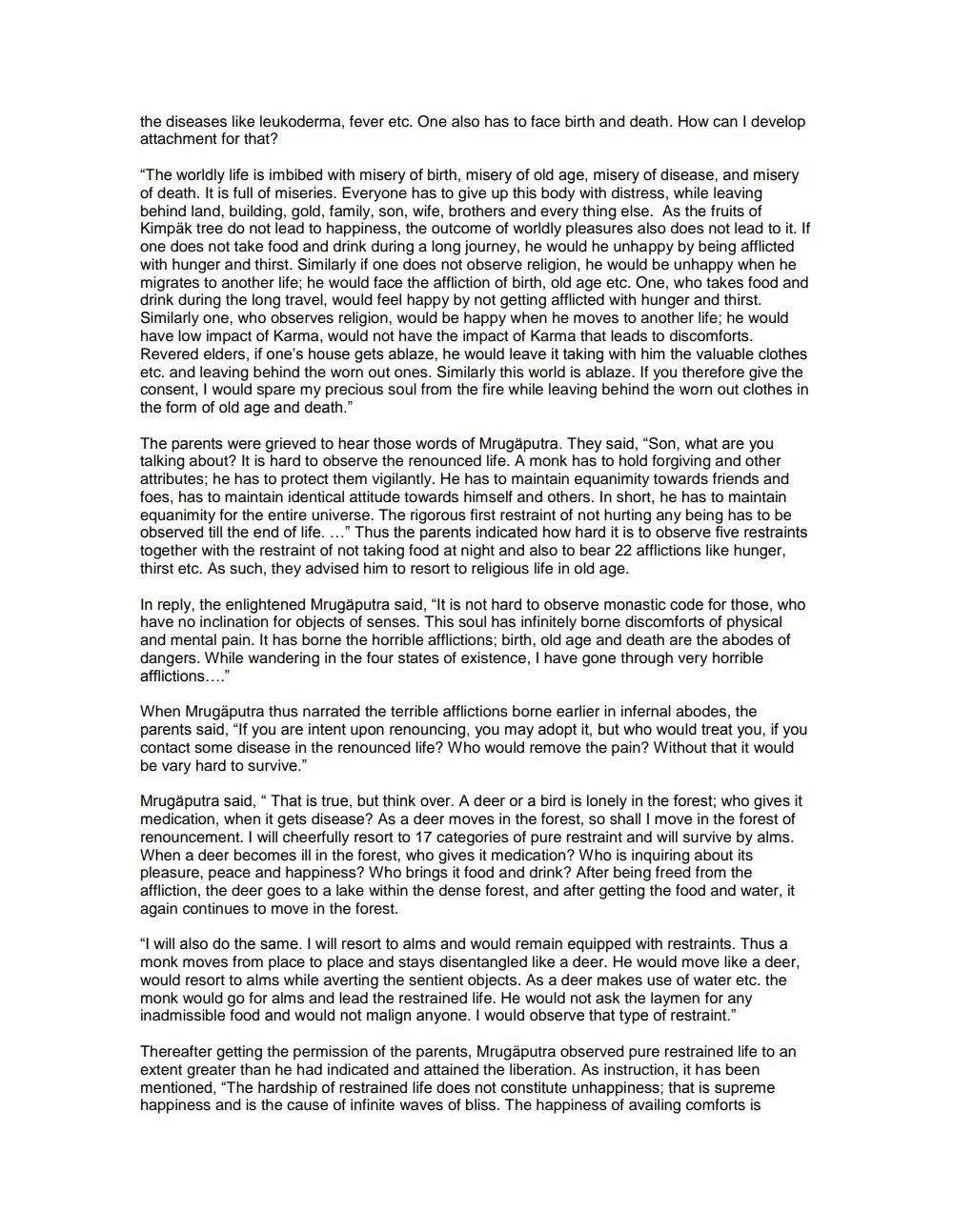________________
the diseases like leukoderma, fever etc. One also has to face birth and death. How can I develop attachment for that?
"The worldly life is imbibed with misery of birth, misery of old age, misery of disease, and misery of death. It is full of miseries. Everyone has to give up this body with distress, while leaving behind land, building, gold, family, son, wife, brothers and every thing else. As the fruits of Kimpak tree do not lead to happiness, the outcome of worldly pleasures also does not lead to it. If one does not take food and drink during a long journey, he would he unhappy by being afflicted with hunger and thirst. Similarly if one does not observe religion, he would be unhappy when he migrates to another life; he would face the affliction of birth, old age etc. One, who takes food and drink during the long travel, would feel happy by not getting afflicted with hunger and thirst. Similarly one, who observes religion, would be happy when he moves to another life; he would have low impact of Karma, would not have the impact of Karma that leads to discomforts. Revered elders, if one's house gets ablaze, he would leave it taking with him the valuable clothes etc. and leaving behind the worn out ones. Similarly this world is ablaze. If you therefore give the consent, I would spare my precious soul from the fire while leaving behind the worn out clothes in the form of old age and death."
The parents were grieved to hear those words of Mrugäputra. They said, "Son, what are you talking about? It is hard to observe the renounced life. A monk has to hold forgiving and other attributes; he has to protect them vigilantly. He has to maintain equanimity towards friends and foes, has to maintain identical attitude towards himself and others. In short, he has to maintain equanimity for the entire universe. The rigorous first restraint of not hurting any being has to be observed till the end of life. ..." Thus the parents indicated how hard it is to observe five restraints together with the restraint of not taking food at night and also to bear 22 afflictions like hunger, thirst etc. As such, they advised him to resort to religious life in old age.
In reply, the enlightened Mrugaputra said, "It is not hard to observe monastic code for those, who have no inclination for objects of senses. This soul has infinitely borne discomforts of physical and mental pain. It has borne the horrible afflictions; birth, old age and death are the abodes of dangers. While wandering in the four states of existence, I have gone through very horrible afflictions...."
When Mrugäputra thus narrated the terrible afflictions borne earlier in infernal abodes, the parents said, "If you are intent upon renouncing, you may adopt it, but who would treat you, if you contact some disease in the renounced life? Who would remove the pain? Without that it would be vary hard to survive."
Mrugäputra said, " That is true, but think over. A deer or a bird is lonely in the forest; who gives it medication, when it gets disease? As a deer moves in the forest, so shall I move in the forest of renouncement. I will cheerfully resort to 17 categories of pure restraint and will survive by alms. When a deer becomes ill in the forest, who gives it medication? Who is inquiring about its pleasure, peace and happiness? Who brings it food and drink? After being freed from the affliction, the deer goes to a lake within the dense forest, and after getting the food and water, it again continues to move in the forest.
"I will also do the same. I will resort to alms and would remain equipped with restraints. Thus a monk moves from place to place and stays disentangled like a deer. He would move like a deer, would resort to alms while averting the sentient objects. As a deer makes use of water etc. the monk would go for alms and lead the restrained life. He would not ask the laymen for any inadmissible food and would not malign anyone. I would observe that type of restraint."
Thereafter getting the permission of the parents, Mrugaputra observed pure restrained life to an extent greater than he had indicated and attained the liberation. As instruction, it has been mentioned, "The hardship of restrained life does not constitute unhappiness; that is supreme happiness and is the cause of infinite waves of bliss. The happiness of availing comforts is




